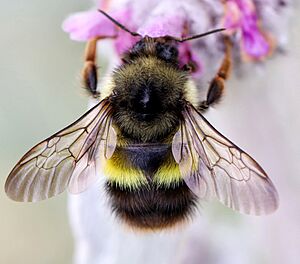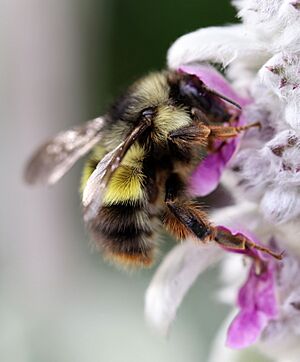Yellow-fronted bumble bee facts for kids
Quick facts for kids Yellow-fronted bumble bee |
|
|---|---|
 |
|
| Conservation status | |
| Scientific classification |
|
| Kingdom: | Animalia |
| Phylum: | Arthropoda |
| Class: | Insecta |
| Order: | Hymenoptera |
| Family: | Apidae |
| Genus: | Bombus |
| Subgenus: | Pyrobombus |
| Species: |
B. flavifrons
|
| Binomial name | |
| Bombus flavifrons Cresson, 1863
|
|
| Script error: The function "autoWithCaption" does not exist. | |
Script error: No such module "Check for conflicting parameters".

The yellow-fronted bumble bee (also known as Bombus flavifrons) is a type of bumblebee. You can find this bee in North America. It lives across most of Canada, Alaska, and the western parts of the United States.
Contents
What Does It Look Like?
This bumblebee is quite strong and sturdy. A queen yellow-fronted bumble bee is about 13 to 16 millimeters long. Her wings can spread out from 27 to 34 millimeters.
Male bumblebees are a bit smaller, around 11 to 12 millimeters long. Their wingspan is about 25 to 26 millimeters. The worker bees are the smallest, measuring 9 to 12 millimeters long. Their wings can stretch from 19 to 27 millimeters.
The yellow-fronted bumble bee has thick, somewhat messy fur. Its head is yellow, but it also has some black hairs mixed in at the back. The middle part of its body, called the thorax, has a mix of black and yellow colors. Often, especially on the queen, there's a black patch in the middle of the thorax.
The first two parts of its abdomen (belly) are yellow. On females, these parts often have a black patch in the middle. The next two parts of the abdomen are red. The very end of its tail is black, but sometimes it can have yellow spots too.
Life and Habitat
Life Cycle
The queen bee wakes up from her long winter sleep around the end of March. She often finds an old mouse nest to build her new home. About a month later, the first worker bees are born.
The bumblebee nest starts to get smaller and weaker by the end of August. All the bees in the nest will die, except for the new queens. These new queens will then find a safe place in the ground to sleep through the winter.
What Do They Eat?
Yellow-fronted bumble bees get their food from many different kinds of flowering plants. They especially like flowers from plant families like Asteraceae (like daisies), Fabaceae (like peas), Saxifragaceae (like saxifrages), and Lamiaceae (like mint).
Where Do They Live?
These bees like to live in high places and cold areas. You can find them in places like tundra (cold, treeless plains), taiga (cold, swampy forests), and mountain forests and meadows.
Other Bees Around Them
Sometimes, another type of bumblebee, called the indiscriminate cuckoo bumblebee (Bombus insularis), will act as a parasite. This means it might try to take over the yellow-fronted bumble bee's nest.
 | Selma Burke |
 | Pauline Powell Burns |
 | Frederick J. Brown |
 | Robert Blackburn |


